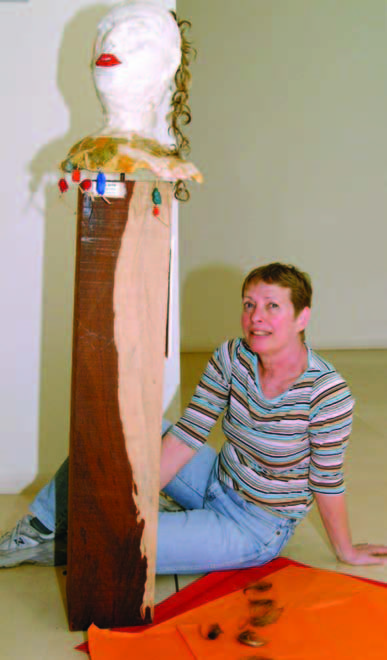The Art of Healing: Art by Breast Cancer Survivors

Breast cancer survivor Talia Shaleet with her artwork
Everyone is aware of the level of expert care that Rabin Medical Center offers to its patients. What is less well known, however, is the degree of thought that goes into planning and managing a patient's care. Essential to this process is the emotional well-being of each and every patient. As you will discover, care at Rabin Medical Center is clearly a science but also an art.
The case of Talia Shaleet proves this point. Three years ago, Talia, a spirited and stylish blond with sparkling sapphire-blue eyes received the diagnosis that she had breast cancer. Talia was classified as a "high risk" patient because her mother had also been stricken with cancer and ultimately died from the disease.
Unlike her mother, Talia—married, a mother of three and an interior decorator by trade—was treated at the Davidoff Cancer Center at Rabin Medical Center. Talia came to understand that a patient's state of mind and level of emotional strength, coupled with support from family and friends, could and would make all the healing difference in the world. In addition to the expert medical treatment received from her caring physician Dr. Salomon Stemmer, treatment that included chemotherapy and surgery, Talia met regularly with a psychologist and a nursing coordinator to nourish Talia's emotional well-being. "Had my mother been privy to the same cutting edge treatment that was available to me at the Davidoff Center," said Talia, "perhaps she would have beaten the odds."
Frieda Ohayon was that nursing coordinator—that special addition to the healing network that has helped to solidify Rabin Medical Center's reputation for patient care. Frieda's guidance, advocacy and support have made a world of difference in Talia's life, as well to the lives of so many others. Nurse Coordinator at The Davidoff Center, Frieda serves as a guide to navigate the way for patients like Talia who have been diagnosed with breast cancer. Frieda is present from the moment the doctor confirms the diagnosis and accompanies the patient through the processes of surgery, the aftermath of surgery, treatment and post treatment.
The origin of the idea of adding a nursing coordinator to the network of healing, itself, proves to be an amazing story. In 1996, Susan Sered, Assistant Professor at Suffolk University in Boston and alumni of Hebrew University in Jerusalem, conducted a study on women with breast cancer. Her research concluded that the process of dealing with hospital protocol and bureaucracy was emotionally demanding for patients who have just been diagnosed with breast cancer. Her research demonstrated that patients cited nurses as one of the most helpful figures at hospitals during cancer treatment. Based upon this and other findings, the Ministry of Health and the Israel Cancer Association created the position of "nurse coordinator."
It was during one of their weekly meetings that Frieda and Talia discussed the idea of creating an art exhibit for women who have breast cancer. Hence, the idea was born out of collaboration between the healer and the one being healed. "When you spend so much time in a place, it starts to feel like a second home," said Talia, "the staff at Davidoff is amazing and one feels the need to give something back."
During its first year, 12 breast cancer patients joined together as exhibitors. By the following year, the number of exhibitors grew to 17. The annual exhibit has been highly praised by both patients who are given an artistic channel to express their experiences and by viewers who are mesmerized by the depth of emotion displayed in the work. This, in turn, has generated growing interest and support demonstrated by the continuous inquiry about opportunities for participation. A sense of strength, integrity and hope is transmitted through the color and movement of each work. The exhibit symbolizes the journey for women who come to The Davidoff Center to be treated and stands as testimony to those who, during and after treatment, have become inspired to offer others hope that they—like Talia—will be cared for by the loving staff of Rabin Medical Center.
Rabin Medical Center believes strongly in the art of healing and in the healing arts. The artwork, sculptures, and landscaping that grace the hospital are integral parts of the healing environment.
The Davidoff Center addresses the medical needs of approximately 600 new breast cancer patients annually. As important as the advanced medical care breast cancer patients receive from doctors, nurses, social workers, psychologist and integrative healers, the contributions of a guide and friend like Frieda will make the journey seem a little less daunting. Medicine is, indeed, just as much art as it is science.
Related Articles
A Leader in Global Oncology: Rabin Medical Center’s Davidoff Cancer Center
Davidoff Cancer Center is an international leader in cancer care and has set the standard as Israel’s first and preeminent comprehensive cancer center.
International Conference in Gender Medicine
The 5th International Conference in Gender Medicine was recently held in Tel Aviv, bringing more than five hundred participants from nineteen countries around the world.
American OB/GYNs Visit Israel's Rabin Medical Center
Under the leadership of John J. Sciarra, MD, Ph.D., a group of fifteen OB/GYNs from across the U.S. and the Bahamas visited Israeli's Rabin Medical Center.